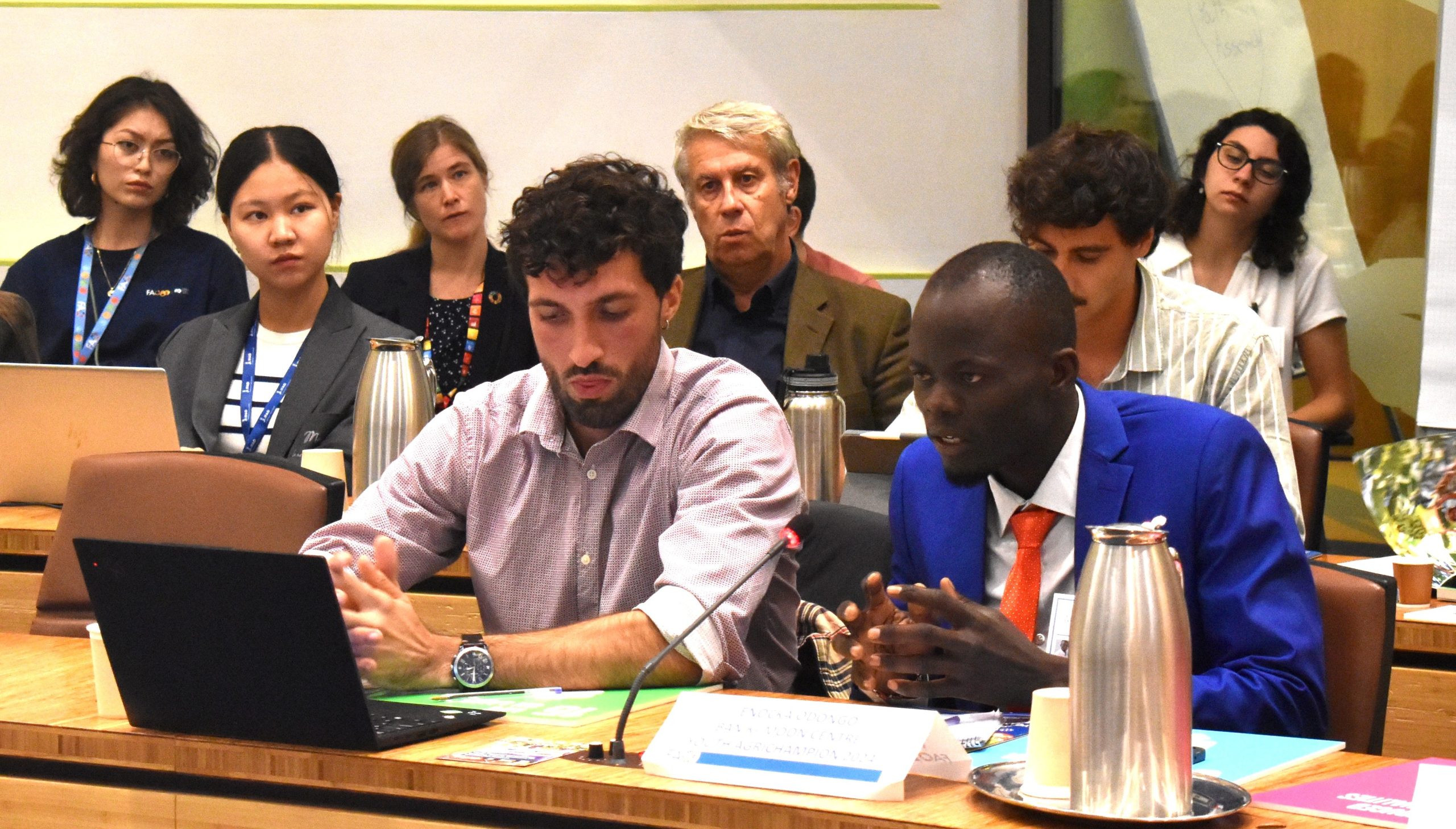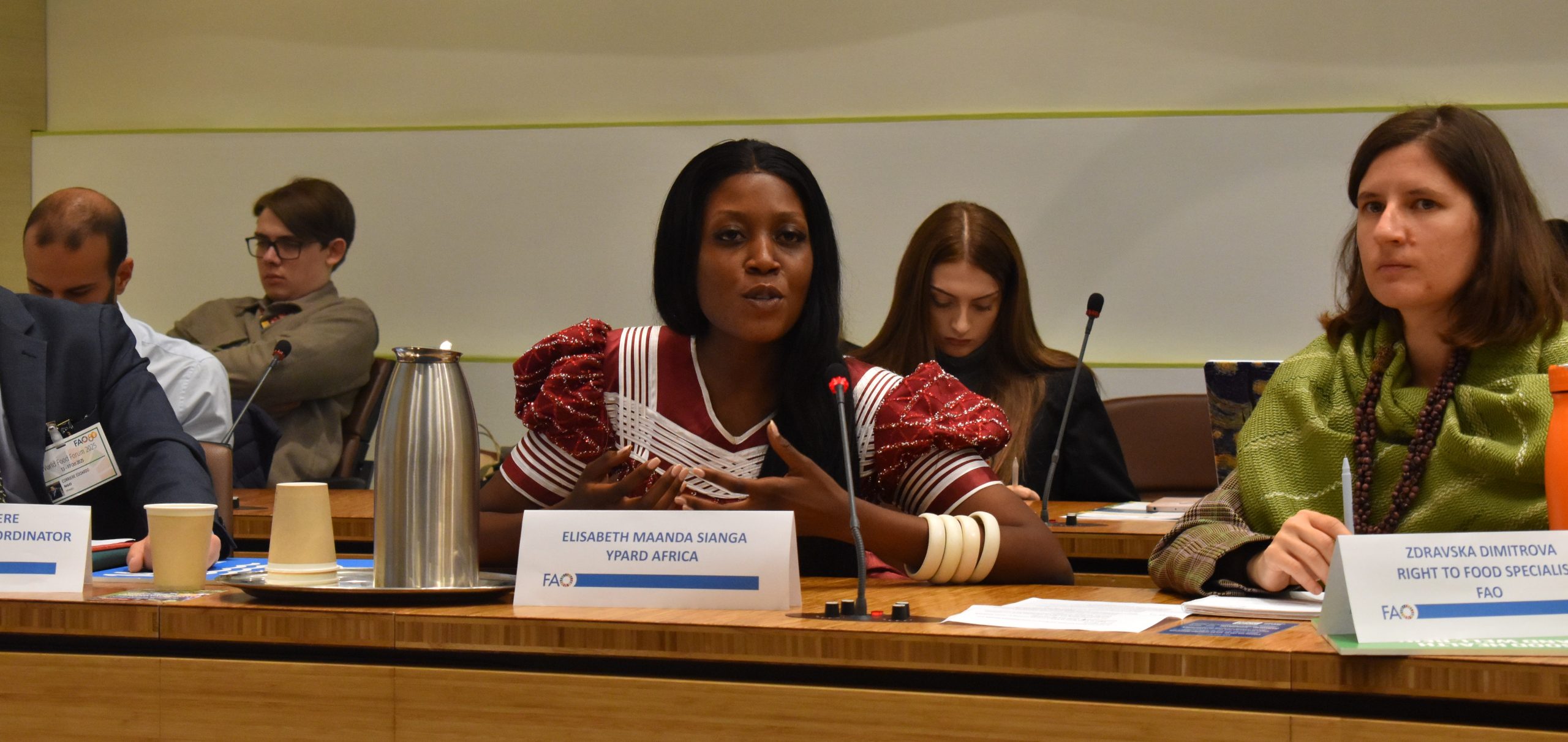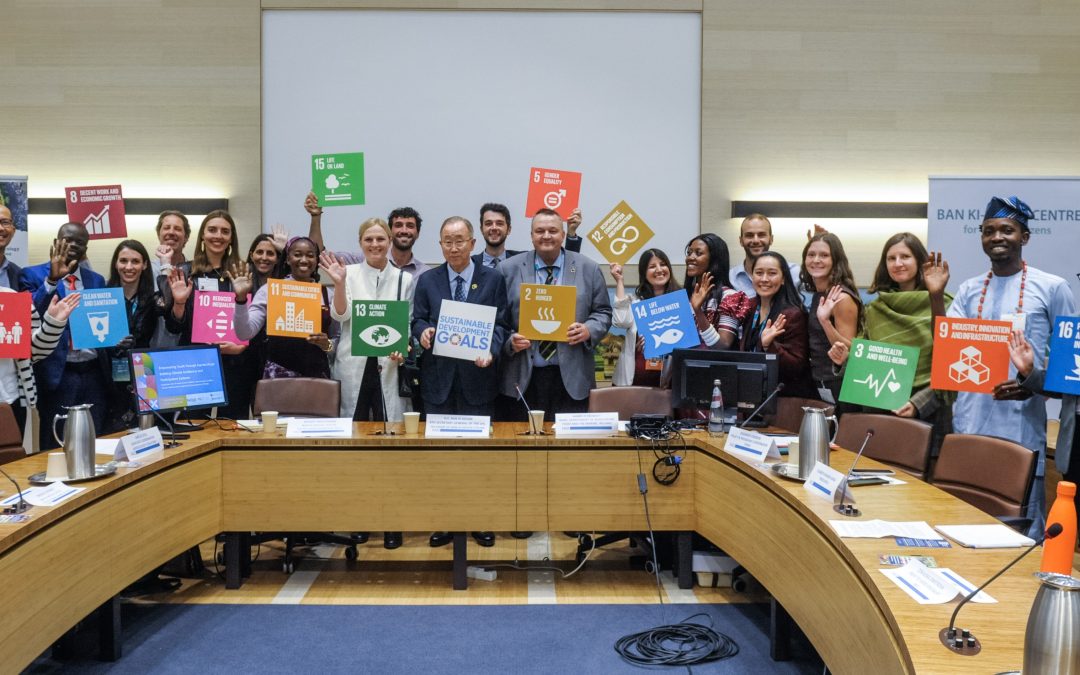Picture © Ban Ki-Moon Center
On World Food Day, October 16th, 2025, the Agroecology Coalition, Ban Ki-moon Center for Global Citizens (BKMC) and Young Professionals for Agricultural Development (YPARD) hosted an event at the United Nations’ Food and Agriculture Organization (FAO) World Food Forum. The event, titled “Empowering Youth Through Agroecology: Building Climate Resilience and Participatory Systems” presented discussions to amplify youth voices and showcase how agroecology can drive inclusive, rights-based, and climate-resilient food systems. Through dialogue between agroecology experts, policymakers, youth activists and farmers, the objective was to unpack the power of agroecology in leveraging smallholder farming communities and young people by showcasing youth-led agroecology initiatives as tangible best practices. The session was moderated by Amélie Steu (Agroecology Coalition) and Edoardo Corriere (YPARD).
H.E. Ban Ki-moon, the 8th Secretary-General of the United Nations, delivered the opening remarks. He spoke passionately about his ongoing commitment to leverage women and youth’s voices, advocating for their active participation in leadership roles and high-level global dialogues. He called on the audience to collectively raise their voices, challenge their leaders, and speak out with confidence.

Amélie Steu reminded the audience that the Agroecology Coalition membership also includes youth organizations (find out more here). Youth account for 16% of the global population—playing a key role in shaping current and future food systems towards sustainability, resilience and fairness, but they are also facing challenges. According to FAO’s report on The Status of Youth in Agrifood Systems, published this summer, youth represent 44% of the agri-food system workforce (2021). At the same time, food insecurity among youth has risen by 7% within 8 years, reaching 24.4% in 2021-23, especially impacting young people in Africa.
Enocka Odongo, a 2024 Youth AgriChampion from BKMC, presented their program that empowers young leaders through workshops, amplifying smallholder farmers’ voices. Insights were compiled into a demand paper to advocate internationally for inclusive agricultural development. After months of participatory workshops with young smallholder farmers, agripreneurs, and activists across Africa, the BKMC finalized its 2025 Youth AgriChampion Demand Paper titled “Youth-Powered Agroecology: Building Climate Resilience for Smallholder Farmers”. Additionally, Enocka Odongo highlighted his participatory work with Kenyan farmers, emphasizing community-driven solutions for sustainable agriculture. He underscored the broader impact of such practices, stating:
I believe that through agroecology and the practice that we undertake we are able to address this too by addressing food security and at the same time we are also enhancing our environmental integrity.

Drawing from their diverse experiences as farmers, agripreneurs, and researchers, and through a series of thematic workshops with experts, they identified key barriers and proposed actionable solutions. Their collective insights are captured in this demand paper which outlines three critical areas for intervention: water management, soil health, and agroforestry.
Wendy Yam Lubudon Kere Osman (2025 BKMC Youth AgriChampion) explained that the first demand emphasizes the urgent need for precise water management to support climate adaptation. The second demand highlights that healthy soils are the foundation of food security and climate resilience, and investing in them means investing in a sustainable future. The third demand focuses on agroforestry, which offers both ecological and economic benefits.
Harry O’Crowley (Head of International Development, UN & SDGs Unit, Economics and Planning Division, Department of Agriculture, Food and the Marine, Ireland) noted that implementing agroecological approaches in Ireland is politically challenging due to the country’s reliance on grass-fed dairy and beef systems—its primary agricultural industries. With limited natural resources and an economy heavily based on agriculture, about 90% of Ireland’s production is exported. He acknowledged the ecological trade-offs but highlighted ongoing mitigation efforts through innovation, including regenerative grazing, multi-species swards, agroforestry pilots, and ecosystem service models. Framing this transition as a national journey, he emphasized bottom-up policies and community initiatives such as water conservation, land regeneration, and the urban ‘Grow it Yourself’ movement. As he put it, “we are on a journey ourselves, at the national, government level, as well as at a citizen level.”

Harry O’Crowley stated:
Ireland’s approach to agroecology is inclusive and equitable. It’s a shared journey and it reflects our ecological science. It reflects our traditional knowledge. It reflects our culture. It reflects our food traditions. It reflects our social values. And by taking all of those as a collective, they are empowering our farmers; they are empowering our researchers; they are empowering our citizens, to co-create solutions to the problems that there are, so that we all have a sustainable people, and we will have a sustainable planet.
Despite limited resources, Ireland actively promotes sustainable agriculture and youth inclusion. For instance, the Department of Agriculture, Food and Marine supports the WFF Ireland Youth Chapter launched in May. Through modest funding, they support rural women’s empowerment globally and sponsors youth participation in international forums. In 2025, Ireland funded eight youth delegates from four Global South countries to attend the World Food Forum, demonstrating their dedication to elevating youth voices in agricultural policy and decision-making.
Zdravka Dimitrova (Agroecology and Food Systems Specialist within FAO’s Rural Transformation and Gender Equality Division) shared:
Agroecology also fully supports the realization of the right to adequate food by promoting sustainable, equitable and people centered food systems that prioritize, and this is very important, dignity, participation and access for all. When agroecology is rooted in the right to food principles, youth are not just participants, but they become leaders and they are right holders that can drive for fair and more resilient food systems.
Moreover, she added that youth face a structural barrier in accessing land. She followed this statement by emphasizing on the gendered experience of younger women and girls, who are especially disadvantaged due to the care burden, early marriages, and restricted educational opportunities.
Zdravka Dimitrova shared that FAO is actively championing youth-led agroecology – through the right to adequate food – as a transformative force in reshaping global and national agri-food systems. FAO is working to create enabling environments that empower young people—especially rural youth and young women—to lead in agroecological innovation.
Elizabeth Maanda Sianga (YPARD Africa), an agronomist by profession, started farming six years ago. She started asking herself questions such as: How do we build the soil? How do we preserve our water? How do we have healthy soil? Sianga shared that her farm operates like a closed loop, working in aquaculture, vegetable production, poultry, small stock, and more. Her farm also recycles the water from the fishponds to irrigate the crops, and with all the crop residues they create compost heaps. With this cycle, they build their soil and nothing on the farm goes to waste. She expressed her passion for indigenous knowledge and practice, incorporating tradition with some innovations where needed, as well as using indigenous seeds. Sianga reflected that agroecology is often interpreted as a new term, rather it is a practice which has been present for a long time; today, they are incorporating innovations with traditional practices.

Elizabeth Maanda Sianga shared her perspective regarding challenges, youth, and opportunities:
In terms of the challenges that I’ve faced as a young person, I wouldn’t like to say challenges, but being young has actually been an opportunity. I always tell young people this: your strongest currency is being a young person. And this is what opens doors for different things to come into your life, especially being young.
Lastly, there was a last round of reflections where Luca Passacantili (IFAD) highlighted IFAD’s inclusive consultation and validation process, which actively engages youth organizations such as YPARD. He announced the upcoming launch of the Rural Youth Action Plan 2026–2031, a strategic initiative designed to place young people at the heart of sustainable and inclusive rural transformation.
Additionally, Wendy Yam Lubudon Kere Osman shared that rural youth are often not finding themselves interested in farming, but that agroecology offers solutions. Agroecology improves rural livelihood as it attracts youth and incorporates sustainable practices such as agroforestry, soil health, and water management.
For the closing remarks, Katre Olmez (BKMC) emphasized that young farmers are the drivers of innovation, transformation, and resilience in agriculture. She called on governments and stakeholders to act by empowering youth with the right tools to ensure a secure future for food systems.
Read More
BKMC Youth AgriChampions Demand Paper 2025: Youth Powered Agroecology Building Climate Resilience for Smallholder Famers. Read here.
YPARD’s presence at the World Food Forum, read their article here.
Agroecology Coalition resources:

